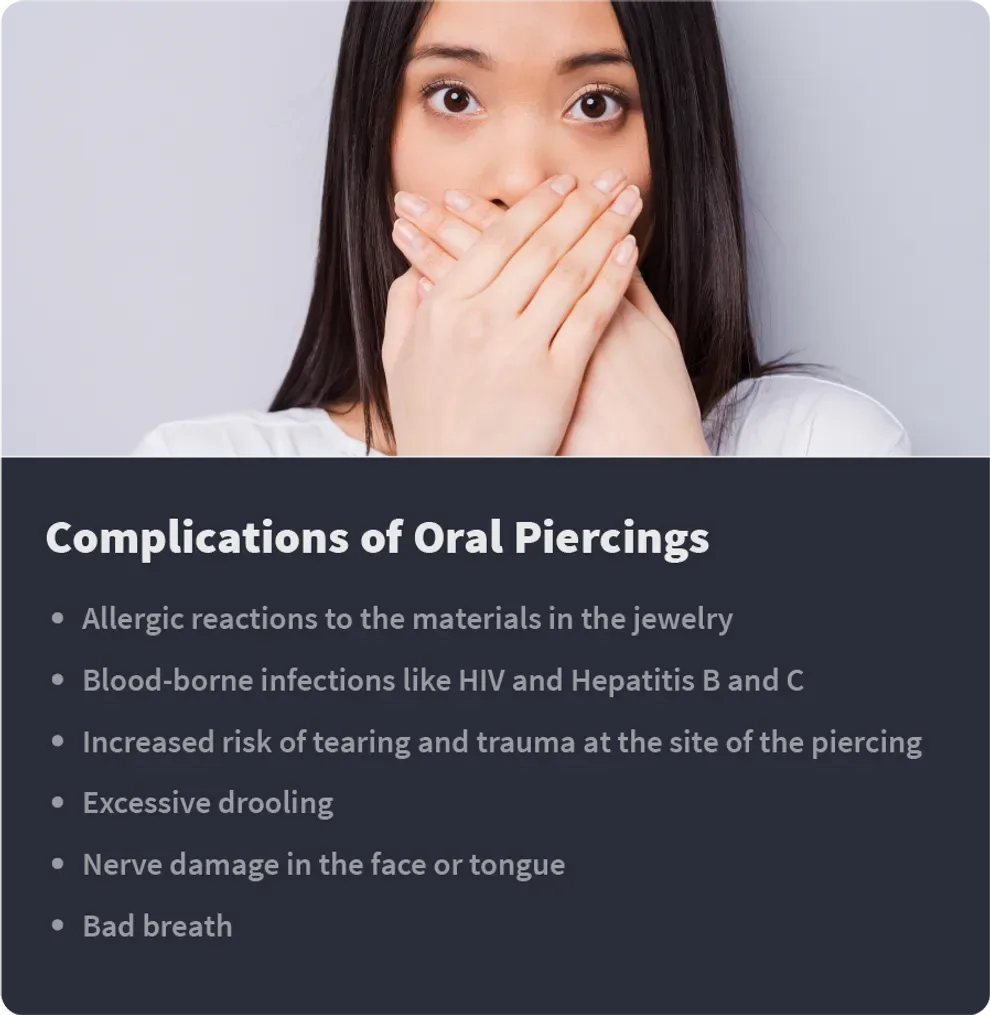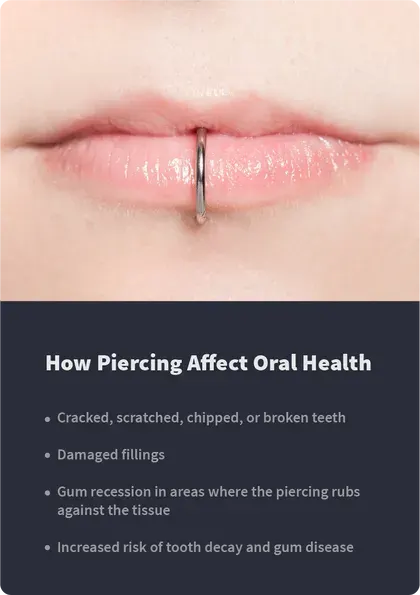How Do Oral Piercings Affect Oral Health? Everything You Need to Know

Table of Contents
- Potential Complications & Risks
- How Piercings Affect Oral Health
- Caring for a Piercing
- Types of Oral Piercings
- Frequently Asked Questions
- References
Oral piercings are a popular way to express a unique style to the world. However, these pieces of jewelry pose several risks to your oral and general health.
Medical evidence associates these piercings with increased rates of gum disease, gum recession, tooth decay and cracked or chipped teeth. They also get infected easily and may cause nerve damage in the face or tongue.
If you choose to get pierced in or around your mouth, you will need to take extra precautions to keep it (or them) from damaging your teeth and gums.

Potential Complications and Risks of Oral Piercings
Getting a mouth piercing puts you at risk for health problems in both the immediate and long-term future.
Because they’re in constant contact with all of the bacteria in your mouth, piercings get infected easily. This is true even when you have had the piercings for years.
Oral piercings may also cause any of the following issues:
Allergic reactions to the materials in the jewelry
Blood-borne infections like HIV and Hepatitis B and C
Increased risk of tearing and trauma at the site of the piercing
Excessive drooling
Nerve damage in the face or tongue
Bad breath
How Piercings Affect Oral Health

Piercings place a hard foreign object in constant contact with the inside of your mouth. As a result, they can have significant negative effects on your oral health specifically. Among them:
Cracked, scratched, chipped, or broken teeth
Damaged fillings
Gum recession in areas where the piercing rubs against the tissue
Increased risk of tooth decay and gum disease if the piercing is not properly cleaned
The American Dental Association recommends that individuals do not get oral piercings, citing the high levels of oral health risk they cause. However, only you can decide if those risks are acceptable to you.
Caring for an Oral Piercing
If you choose to get an oral piercing, it’s important to take care of it. Here are some guidelines to help you avoid the common problems can develop.
Do not attempt to twist, remove or disturb baubles or jewelry in your piercing before the site has fully healed.
Avoid touching the jewelry with your teeth or tongue. Many people who wear oral piercings develop bad habits of clicking their jewelry against their teeth and gums, resulting in a much higher incidence of dental problems.
Use an alcohol-free mouthwash regularly both during and after the healing period to minimize the chance of infection.
Remove your jewelry before engaging in contact sports. This minimizes the chance that it will become caught on something and tear the flesh around your piercing.
Choose lightweight plastic jewelry to reduce your chances of tooth damage.
Consistently monitor your oral piercing for signs of infection. These include swelling, tenderness, and unusual discharges (especially if they smell bad).
Types of Oral Piercings
Oral piercings prove to be a popular type of body modification involving small bits of metal or plastic jewelry that are inserted through a person's oral tissue for decorative effect. Approximately 5 percent of young adults worldwide have at least one oral piercing.
Piercing jewelry comes in the following shapes:
Rings
Studs
Straight barbells
Curved barbells
Hoops
Some of the most common body locations for them include:
Lips
Tongue
Cheeks
Frenulum (the thin connective tissue between your lips and gums)
Some specific combinations of oral piercings have proved so popular that they’re now well-known under specific names. For example, “snake bites” are two symmetrical lower lip piercings, while “angel bites” are the same thing on the upper lip.
You may also have heard of a type of oral jewelry called a dental piercing. This jewelry is not actually inserted through the tooth but is instead attached to it using composite adhesive.
Frequently Asked Questions about Oral Piercings
Not necessarily. Bad breath happens when you have a lot of bacteria built up in your mouth. Having a tongue piercing might make it more difficult to brush your teeth thoroughly and clean out the bacteria that collects over the course of a day. The area around the piercing may also collect bacteria more quickly than the rest of your mouth. Take your time when brushing your teeth and consider using an alcohol-free mouthwash to keep bacteria levels in your mouth low.
It depends. Oral piercings can damage your teeth or lead to tooth decay if you aren't careful with them. The American Dental Association advises against getting them due to the many risks involved. However, if you make sure to keep your piercing away from your teeth and clean it properly on a regular basis, you can avoid most of these problems.
Some oral piercing locations (such as the lips, frenulum, or the tip of the tongue) are more likely to lead to dental issues than others. If you are concerned about what your piercing may do to your teeth, ask your dentist about which piercing placements are least likely to cause problems.
Any piece of metal or plastic that is inserted through your lip, tongue, cheek, or any other oral tissue is considered an oral piercing.
No, but you may experience temporary or permanent nerve damage in your tongue. You will still be able to move your tongue, but the damage may affect your sense of taste or change the way you move your mouth.
Oral piercings can last a lifetime if they are properly cared for, but most people remove them at some point during their lifetime. Once a piercing is removed, your tongue can take anywhere from a few days to a few weeks to heal over the empty space.
